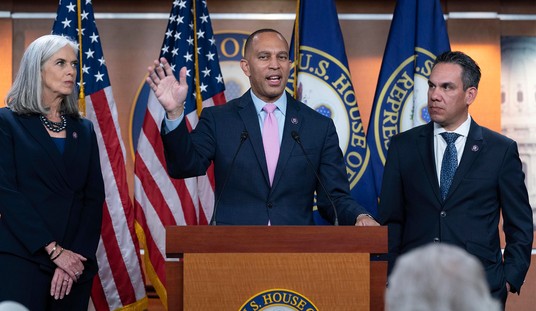Angela Merkel has won her fourth straight German election for the CDU/CSU centrist sister parties. But there are signs that the center is falling.

>German Chancellor Angela Merkel, left, delivers a speech as parliamentary faction leader Volker Lauder, center, and EU commissioner Guenther Oettiner, right, applaud after the parliament election at the headquarters of the Christian Democratic Union CDU in Berlin, Germany, Sunday, Sept. 24, 2017. (AP Photo/Michael Sohn)
Angela Merkel’s Christian Democratic Union (CDU) is the successor to the old Center Party in Germany, and has governed Germany with its center-right partner in Bavaria, the Christian Social Union (CSU), for most of the history of the Federal Republic. Even when they didn’t govern, sometimes they still got the largest share of the vote (see 1976 and 1980).
Konrad Adenauer won four elections for four terms as Chancellor. Helmut Kohl won five elections for four terms as Chancellor. And now Angela Merkel goes into history beside them, having won her fourth election for a fourth term as Chancellor. However she’s been in a weaker spot. Adenauer won majorities or worked with liberal FDP and conservative DP. Kohl worked with the liberal FDP his entire time in power. However Merkel more often than not has had to work with the socialist SDP in a “grand coalition.” Unless she is willing and able to glue together the Greens and the liberal FDP together in a coalition with her, she’ll have to do it again, too.
Her party union beat the socialists 32.9-20.8 in the popular vote, as of this writing. That sounds like a good lead, but that 32.9 is the Union parties’ lowest result since 1949, the first election in new Federal Republic. Why such a bad result? A newer party is making its way into the Bundestag for the first time: the Alternative for Germany (AfD). They’re set to get 13.1% of the vote, way up from their 4.7% last time, which was below the 5% threshold to get in. The liberal FDP has also gotten back in at 10.5%, but they used to get levels like that routinely, so that can’t really explain the new weakness of CDU/CSU.
The socialists, really seen as center-left relatively, are also down. That 20.8% is their lowest result ever. Some of their support went to AfD, sure. But the continued strength of the Greens (8.9%) and the (former Communist) Left Party (8.9%) have put them in a weak spot. The two big center parties are down to a mere 53.7% of the vote. Imagine if Republicans and Democrats only got that much of the vote?
So who is the Alternative for Germany? They are a party of nationalism, of social traditionalism, of opposition to Islam, and of a rollback of European Union institutions such as the Euro. They’ve grown in popularity mostly because of the Merkel-European Union open door to “refugees,” and the series of violent crimes resulting from that.
Unfortunately as much as the party poses as mainstream and harmless, they are showing dangerous, fascistic tendencies. They are openly, intentionally trying to recapture Nazi rhetoric of Volk and Vaterland. They are allying with the Holocaust-denying National Front of France in the European Parliament. Co-founder Björn Höcke this year condemned a Holocaust memorial built in Berlin. But out of options, enough Germans have resorted to voting for them, that the political system stands at the brink of change.
Merkel says she will not change policies in response to AfD’s surge. But will she have that luxury next time around? The Anti-semites are now the #3 party. How long can she hold them off without looking out for her own people, in the name of European unity?













Join the conversation as a VIP Member